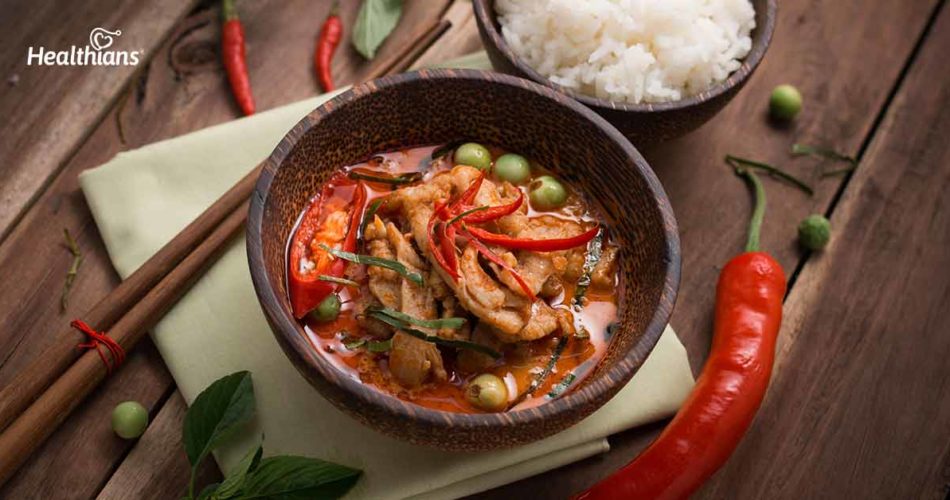Contributed by: Healthians Team
Introduction
Have you ever puzzled why a tasty lunch or an afternoon snack is frequently followed by an unexplainable bout of sweating?
Sweaty armpits and clammy palms are just a few examples of where this uncomfortable sweat may manifest itself.
Sweating after eating is frustrating and annoying.
It may affect your normal routine life by leading to embarrassment, social anxiety and lowered self-esteem due to the fear of body odour.
Fortunately, there are several foods that can help you stop sweating, so let’s get started.
Why do I sweat after I eat?
There are two primary reasons why you sweat during or after eating.
- Certain foods you’re eating
- Some underlying medical conditions
Foods That Make You Sweat
Did you realise that your diet can impact how much you sweat? Some foods trigger your body to sweat more than others.
These trigger meals frequently have diverse biological explanations for making you sweat.
Let’s look at a few food choices you may want to avoid if you’re out to a social gathering where you’d rather not sweat.
- Spicy Foods
- Coffee and Caffeine
- Alcoholic beverages
- Sugar & Carbohydrates
- Meats & Protein
- Hot food & drink
- Processed junk food
Now that you know what foods can make your skin start to drip, keep reading to find out why each one can exacerbate your sweating problems.
Spicy foods
Data across numerous studies indicate that certain spices — like cumin, cinnamon, turmeric, peppers, and chillies — can raise your body temperature and trigger your nerves to sweat more.
Capsaicin, a molecule present in spicy foods, basically tricks your body into believing it’s hot, causing you to feel warm, flushed, and a little sweaty.
The only way to stop those little beads run down your forehead after something super spicy is to stop eating spicy food.
Caffeine
If you like coffee or other caffeine-containing drinks, you could be in for a sweaty day.
Experts believe that coffee not only wakes up your body, but it also wakes up your sweat glands. Caffeine stimulates the neurological system and makes you sweat more.
It also causes your blood pressure to rise, and your heart rate to increase, which causes the physiological sweat response.
So, if you’re ready to reduce the excess sweat, try decreasing or eliminating caffeine altogether.
Alcohol
Alcohol causes your blood vessels to dilate, which, in turn, causes an uptick in sweat production.
Consuming alcohol can also increase your heart rate and widen blood vessels in your skin. This can trigger profuse perspiration.
The best treatment for avoiding sweats from alcohol consumption is to not consume alcohol.
Sugar and carbohydrates
If you consume a high-sugar snack or carb-heavy meal, your blood sugar can rise.
To combat that spike in blood sugar, your body releases a hormone called insulin.
If your insulin levels get too high, it causes blood sugar to dive, which can cause sweating.
Limiting carbs and cutting out sugar may reduce perspiration.
Hot foods and drinks
Researchers believe that warm foods and drinks can increase sweating.
This is because they warm you up, causing you to sweat, usually around your lips, nose or forehead.
If you sweat too much, try eliminating hot drinks to get sweat-blocking benefits.
Processed foods
Most processed foods like white bread, fast food and junk food are typically heavy in fat and low in fibre, making digestion difficult.
To digest them, your body must do a lot of work and spend a lot of energy.
This raises your core temperature, causing you to sweat.
If the processed food also contains sugar, your body goes into overdrive to process them, making digestion even more challenging.
Food intolerances
All of these foods are commonly used as triggers. However, if you find yourself sweating excessively after eating a particular food, you might have an intolerance or allergy to that food.
Your doctor can run a test to identify if you have an allergy or intolerance.
Final thoughts
And, as the old adage goes, if doing something hurts, don’t do it.
If certain foods cause you discomfort, avoid them to keep your heavy sweating at bay.
Moreover, you should also frequently opt for health screening. It provides you with vital insights into your health, allowing you to take necessary measures to improve it.




